Knowing how to hire a Hotel Manager is key to improving your property’s operational efficiency, profitability and guest satisfaction. To help you find the right candidate, we’ve outlined a step-by-step guide covering everything from defining the role to onboarding and setting them up for success.
How To Hire a Hotel Manager in 6 Simple Steps
Hiring the right Hotel Manager requires more than just reviewing resumes. From clearly defining the role to onboarding effectively, each step plays a role in ensuring you choose a candidate who can lead operations, manage staff and elevate guest experiences.
Step 1: Understand the Role
The responsibilities of a Hotel Manager can vary greatly depending on the size and structure of the hotel.
In smaller establishments, there’s usually just one person overseeing all operations, from front desk services and housekeeping to guest relations and budgeting.
In contrast, larger hotels typically have specialized managers for each department, such as Front Desk Operations Managers, Housekeeping Managers and Guest Services Managers.
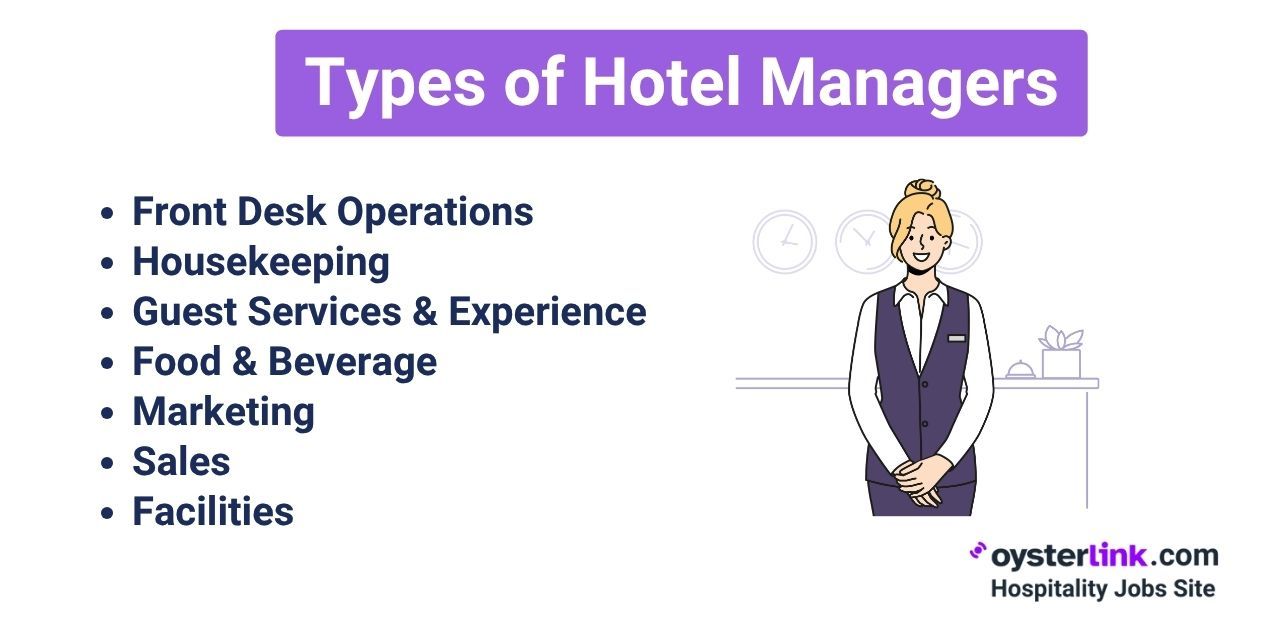
Understanding whether the role requires managing all operations or coordinating multiple teams is important in finding a candidate who can meet your hotel's specific needs and set clear expectations.
Step 2: Create a Hotel Manager Job Description
Once you have a clear understanding of the type of Hotel Manager you need, you can start writing a detailed job description.
Make sure to match the role’s requirements with the necessary qualifications.
In addition to matching qualifications to the role’s requirements, specify the type of property the candidate will be working in.
While you may already have an "About Us" section in your job posting or a link to your website, directly stating whether the position is for a boutique hotel, resort or corporate chain provides applicants with essential context about their work environment.
Finally, ensure compliance with state labor laws by reviewing regulations regarding the disclosure of salary ranges in job descriptions.
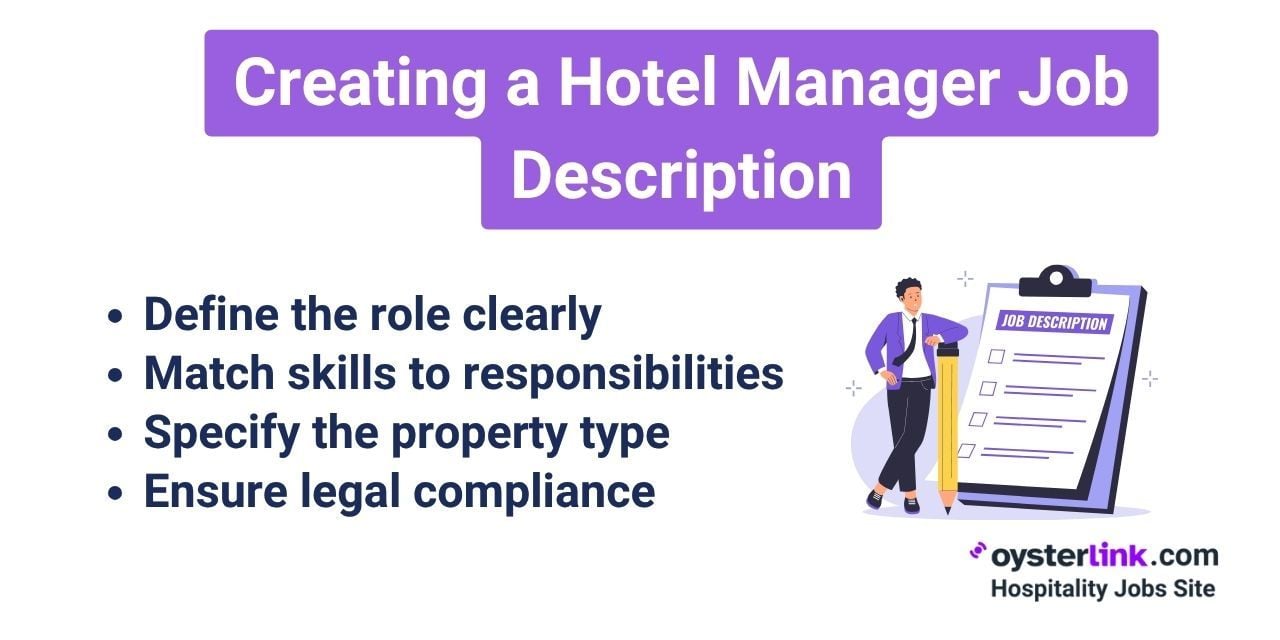
While not all states require this information in job ads, some, like Colorado, California and New York, mandate pay transparency.
Including this information when required not only ensures legal compliance but also builds trust, giving potential candidates clear expectations about compensation and benefits from the outset.
Step 3: Identify the Recruitment Channels You’ll Use
To find your ideal candidate, it’s essential to use a variety of recruitment channels tailored to the role and your target audience. Here are some options to consider.
Online job boards
Despite a survey suggesting that online job boards have become less effective in finding candidates, they remain a valuable resource, allowing you to reach a broad audience and providing tools to filter applications based on specific qualifications.
Platforms like CareerBuilder, Monster.com and ZipRecruiter have extensive databases of job seekers and advanced features such as AI-driven matching, applicant tracking and integration with company hiring tools.
To achieve the best results, consider supplementing these general job boards with hospitality-specific platforms like Hcareers, Hospitality Online and OysterLink.
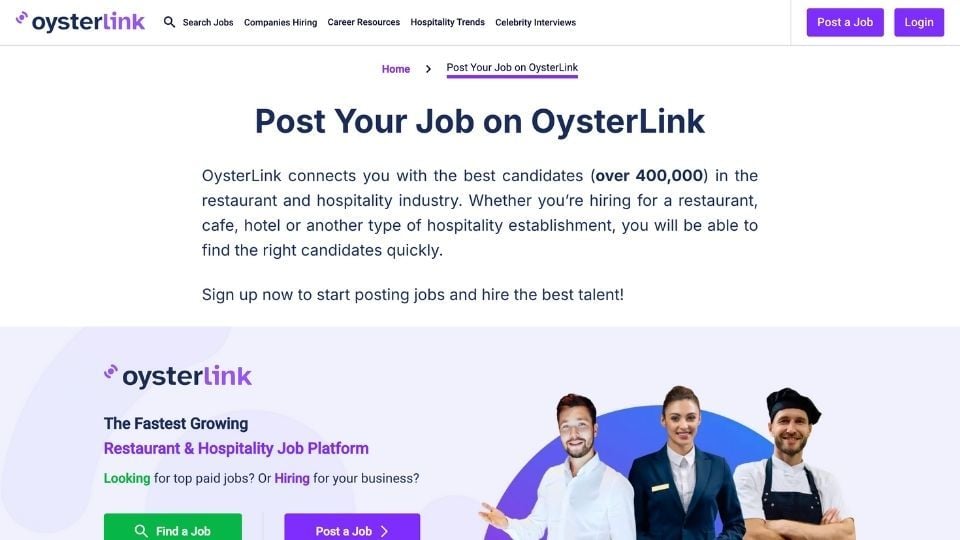
These industry-specific job boards are designed to connect you with candidates who have experience in hotel management, making it easier to find qualified candidates.
With OysterLink, you can post a job and reach a targeted audience of hospitality professionals. This is especially useful for smaller establishments or those with limited recruitment budgets.
By combining the reach of general job boards with the industry focus of platforms like OysterLink, you can improve your chances of finding a candidate who meets the specific needs of your hotel.
Social media
Social media platforms are powerful tools for promoting your job openings and connecting with potential candidates.
LinkedIn, in particular, allows you to target professionals with relevant experience in the hospitality industry, while Facebook groups dedicated to hotel management and hospitality careers help you tap into niche talent pools.
Instagram can also be effective for showcasing your hotel’s culture and engaging candidates who align with your brand’s values.
Posting about job opportunities across these platforms can expand your reach and attract a more diverse group of applicants.
Watch this video to learn practical strategies for using social media in your hiring process.
Company website
Your hotel’s career page plays an important role in attracting the right candidates.
A well-designed career page with detailed job descriptions, company culture highlights and a user-friendly application process can help convert website visitors into applicants.
It also allows you to showcase your hotel as an employer of choice, emphasizing the benefits of working with your team. This channel gives you direct control over the recruitment process and maintains consistency in how your hotel is represented to potential hires.
By using multiple channels, you increase your chances of finding a candidate whose skills and experience align perfectly with your hotel’s needs.
A survey shows that a user-friendly career page with clear navigation and relevant information can significantly boost your hotel’s appeal to candidates. The more intuitive and effective the site feels, the more likely candidates are to view your organization as an attractive place to work.
Step 4: Ensure a Structured Interview Process
Prepare a standardized set of interview questions tailored to assess the candidate’s leadership, problem-solving abilities and industry knowledge. Include questions that evaluate cultural fit to ensure the candidate aligns with your hotel's values and work environment.
For example, you might ask how they’ve handled staff conflicts in the past or how they’ve implemented strategies to improve guest satisfaction metrics.
Next, establish a scoring system to evaluate responses objectively. This minimizes bias and ensures decisions are based on measurable performance during the interview. For instance, you could use a 1–5 scale where:
1 = Poor: The response is incomplete or irrelevant.
2 = Below Average: The response is vague or lacks detail.
3 = Average: The response meets basic expectations but lacks depth.
4 = Good: The response is detailed, relevant, and demonstrates a clear understanding.
5 = Excellent: The response is comprehensive, insightful and demonstrates expertise.
A candidate scoring a 5 when asked “How have you handled unexpected staffing shortages?” would provide a specific example. They would detail the steps they took to address the issue, the outcome and how they minimized the impact on operations.
Finally, train your interview panel on the process, emphasizing the importance of sticking to the prepared questions and scoring system to maintain consistency.
When selecting the interview panel, involve key stakeholders such as department heads, especially if you’re running a large hotel.
For smaller properties, you might include the owner or senior staff who understand the hotel’s unique challenges and culture.
This collaborative approach ensures the candidate is evaluated from multiple perspectives, leading to a well-rounded hiring decision.
Watch this video for practical tips on conducting structured interviews effectively.
Step 5: Finalize the Offer
Once you’ve identified the ideal candidate through interviews and evaluations, the next step is to finalize the job offer.
Begin by clearly outlining the key terms of employment, including the agreed-upon salary, benefits and work schedule. Make sure these terms match what was discussed during the hiring process to avoid any misunderstandings.
Draft a formal offer letter that includes the agreed terms and conditions. This letter should specify the start date, reporting structure and any probationary period. Be transparent about expectations, such as key performance metrics or milestones for the first 90 days, to set the tone for a productive working relationship.
Finally, communicate the offer to the candidate. Highlight how their skills and experience align with the hotel’s goals, emphasizing their potential impact on the team. Provide a timeline for them to accept or negotiate the offer, allowing for a fair decision-making process.
Step 6: Onboarding and Setting Goals
A structured onboarding process helps your new Hotel Manager transition effectively while aligning with your hotel's operations and culture.
Proper onboarding and goal-setting play a key role in employee retention. They foster a sense of support, direction and purpose, ensuring managers feel prepared to succeed in their new role.
Orientation
Start with a comprehensive orientation to familiarize the new manager with your hotel’s operations, team and company culture.
- Introduce the hotel: Conduct a detailed tour of the property, including key areas such as the front desk, housekeeping, food and beverage outlets and back-of-house operations. Highlight unique features of the property, such as its history, guest demographics or notable services.
- Meet the team: Arrange introductions with department heads, key staff members and any direct reports to build rapport and foster collaboration.
- Provide access to SOPs and systems: Share essential documents like standard operating procedures (SOPs), employee handbooks and operational policies. Ensure the manager has access to key software systems for reservations, payroll and inventory management, with appropriate training if needed.
Set initial goals
Establish clear and measurable performance benchmarks for the first 30, 60 and 90 days to guide the manager’s priorities.
- 30 days: Focus on learning the property’s operations, understanding guest expectations and building relationships with the team.
- 60 days: Begin implementing minor improvements or changes based on initial observations, such as refining workflows or addressing staff concerns.
- 90 days: Deliver tangible results, such as achieving specific KPIs like guest satisfaction scores, cost savings or improved team efficiency.
Interview Questions To Help You Find the Right Hotel Manager
Asking the right questions during interviews helps reveal a candidate’s true capabilities and leadership style.
Go beyond generic questions — ask situational ones like, “How have you handled guest complaints that escalated to upper management?” or “How do you motivate staff during high-pressure periods?”
These questions help you gauge decision-making, communication and problem-solving skills.
Also, include culture-based questions to determine whether their management style aligns with your hotel’s values and team dynamics.

By focusing on both technical and behavioral responses, you can identify candidates who lead with both skill and integrity.
Common Mistakes To Avoid When Hiring a Hotel Manager
Hiring the right Hotel Manager requires careful planning and evaluation — yet many employers fall into common traps that lead to poor hires or high turnover. Here are key mistakes to avoid during the selection process:
- Rushing the hiring process: Prioritizing speed over quality often results in hiring someone who isn’t the right fit for the role.
- Focusing only on experience: Overlooking leadership style, adaptability and cultural fit can harm long-term team performance and morale.
- Failing to define clear expectations: Without clear responsibilities and goals, misalignment between management and ownership can quickly arise.
- Relying on a single interviewer: Involving multiple stakeholders provides diverse perspectives and a fairer evaluation of each candidate.
- Skipping reference and background checks: Neglecting verification steps increases the risk of turnover, performance issues and potential liability.
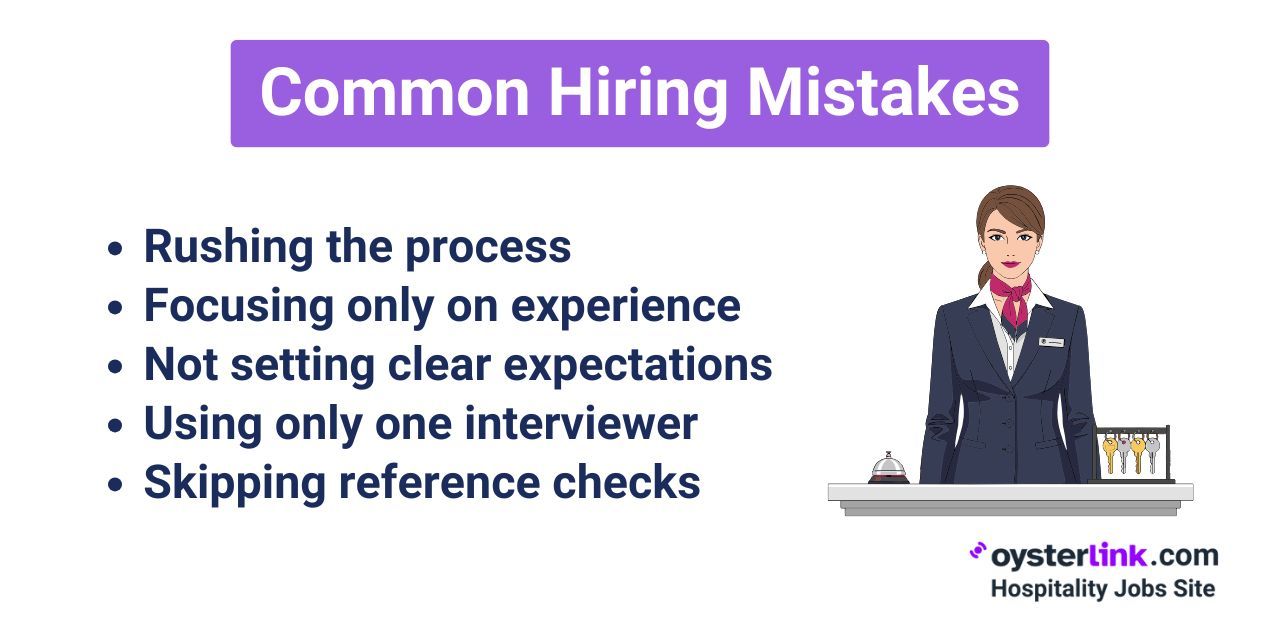
Essential Skills Every Successful Hotel Manager Should Have
Successful Hotel Managers bring a balanced mix of leadership, strategy and people skills that drive both guest satisfaction and team performance. Here are the key abilities that set top-performing managers apart:
- Operational expertise: A strong grasp of hotel operations ensures efficiency across all departments, from front desk to housekeeping.
- Communication skills: Clear, confident communication fosters teamwork, guest satisfaction and strong relationships with staff.
- Organizational and leadership abilities: The ability to delegate, prioritize and motivate teams keeps daily operations running smoothly.
- Financial literacy: Understanding budgets, revenue management and performance metrics is essential for sustaining profitability.
- Emotional intelligence: Empathy and conflict-resolution skills help create a supportive, guest-focused environment.
- Professionalism with empathy: Leading with respect and compassion ensures both guests and employees feel valued and engaged.
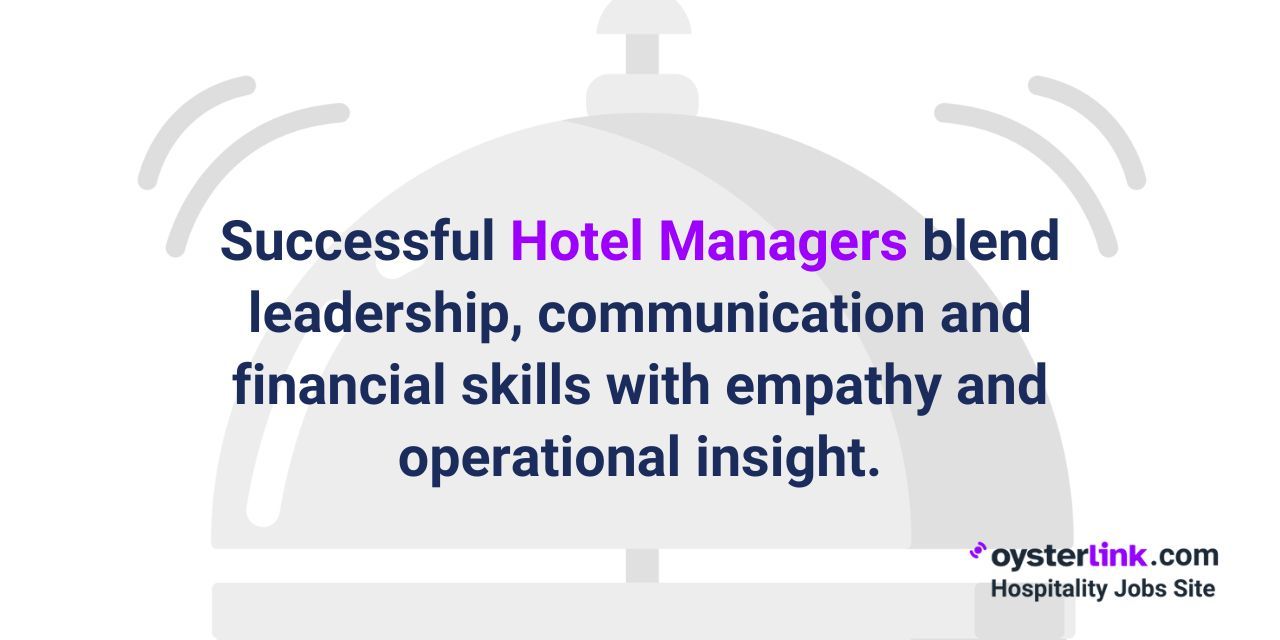
More Resources on Hotel Manager Hiring and Careers
If you’re looking to grow your career as a Hotel Manager or hire one for your property, these resources offer reliable guidance, industry insights and practical tools to help you make informed decisions.
- U.S. Bureau of Labor Statistics (BLS): Data on job growth, pay trends and employment outlook for lodging managers
- American Hotel & Lodging Association (AHLA): Training programs, certifications and research on hospitality workforce trends
- OysterLink – Pros and Cons of Being a Hotel Manager: Insight into the rewards and challenges of managing a hotel, from career growth to daily pressures
- OysterLink – Tips on Hotel Management for Hotel Managers: Practical advice to help hotel managers improve operations, lead teams and enhance guest satisfaction
How To Hire a Hotel Manager: Final Thoughts
Knowing how to hire a Hotel Manager goes beyond reviewing resumes — it involves a strategic, step-by-step process that ensures long-term success.
From clearly defining the role to selecting the right recruitment channels and setting measurable onboarding goals, each phase plays a vital role in finding a candidate who can lead with confidence.
A strong Hotel Manager doesn’t just run operations smoothly — they elevate guest satisfaction, support team performance and help your property meet its financial and service goals.
By following the steps outlined in this guide, you’ll be better equipped to make a hire that delivers lasting value to your hotel.
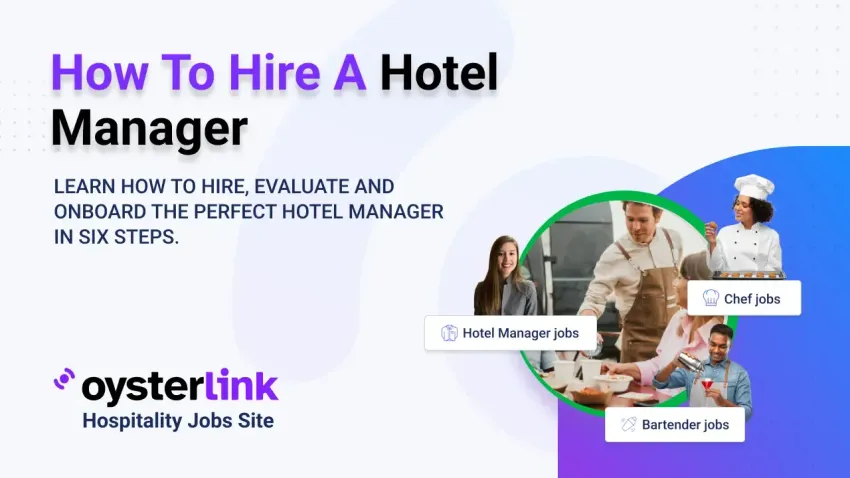












Loading comments...